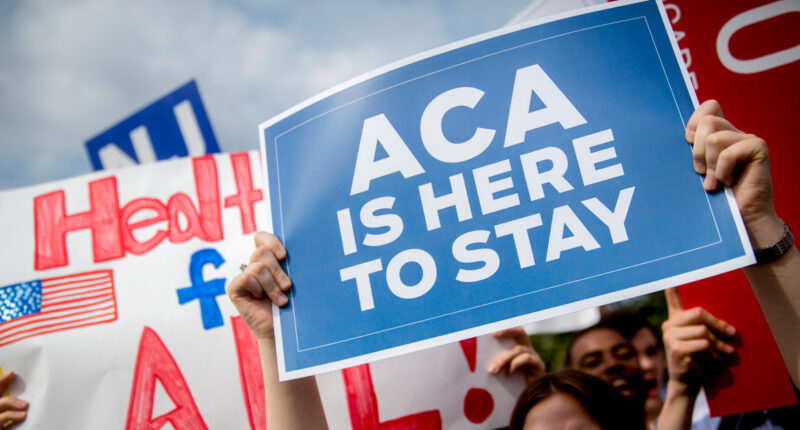Share this @internewscast.com
In late September, Laurel Vincenty received a notification from Blue Cross Blue Shield stating that the subsidies supporting a significant portion of her health insurance would cease at the year’s end, leading to a sharp increase in her monthly premiums.
Laurel, 64, and her husband Philip, 62, who reside in North Carolina, obtain their insurance through the Affordable Care Act. Currently, they pay about $400 monthly while an additional $1,700 is covered by subsidies that are about to expire.
Both Vincenty and her husband are self-employed. Laurel was diagnosed with breast cancer in 2020, and Philip experienced a heart attack in 2024. These health issues have resulted in thousands of dollars in medical expenses that they are still managing. Their monthly medication costs also add up to several hundred dollars.
Vincenty decided to take on an additional job this month in preparation for the increase in premiums next year, although she’s uncertain if this will sufficiently cover the added expenses.
“Receiving the letter was frustrating,” she shared, “considering the potential loss of subsidies and uncertainty surrounding our ability to afford health insurance.”
The enhanced ACA subsidies that the Vincentys are about to lose are a significant issue in the current government shutdown debates. Congressional Democrats insist that to gain their support for reopening the government, these subsidies — which initially became available under the 2021 American Rescue Plan and were later extended to 2025 through the 2022 Inflation Reduction Act — must continue.
Open enrollment for ACA plans begins Nov. 1 in most states, and people already enrolled in plans are starting to get notices about next year’s rates. According to an analysis from the health policy research group KFF, without the subsidies, average out-of-pocket premium payments are expected to double, from $888 a year to $1,904.

Lawrence Gostin, director of the O’Neill Institute for National and Global Health Law at Georgetown University, said the damage is already starting.
“Even if a deal is done to extend the subsidies, many enrollees will drop out due to the sticker shock,” he said.
‘Unpleasant news’
Insurers are required to send ACA enrollees renewal notices no later than the first day of open enrollment, according to rianna McIntyre, an assistant professor at the department of health policy and management at the Harvard T.H. Chan School of Public Health.
The notices typically include information about the next year’s coverage and premiums, though some provide more specifics than others.
“That means we should expect a lot of marketplace enrollees to be receiving unpleasant news about their premiums in mid- and late-October,” McIntyre said.
People may have the option to switch to a plan with lower premiums — going from a silver-tier plan to a bronze-tier plan, for example — but those switches often come with a large increase in deductibles, she said.
Navigators who help people enroll in ACA plans might have been well-situated to help people work through their options, McIntyre added, but earlier this year the Trump administration cut their funding by 90% in states that use the federal HealthCare.gov platform, the online marketplace for ACA plans.
More than 24 million people are enrolled in ACA plans this year, and about 9 out of 10 — 22.3 million people — get enhanced subsidies, according to KFF. If the subsidies expire, almost 4 million people are expected to drop their coverage for 2026, according to an analysis from the Congressional Budget Office.
Jeff Feldman, a 60-year-old musician in Phoenix, is considering dropping his coverage next year.
He got a letter Monday from HealthCare.gov that stated: “The extra financial help that was available because of the COVID pandemic ends on December 31, 2025.”
“Our records show you qualified for financial help in 2025,” the letter read. “If you qualify for financial help in 2026, you’ll likely pay more for your Marketplace plan premium.”
Feldman estimates his monthly premiums will triple — from $300 to $900, while his $9,000 yearly deductible will likely go unchanged.
“They just priced me right out of the market,” he said. “I have two jobs, and I’m going to start driving for Uber and Lyft just to get some extra money. And even with that, I can’t afford $900 a month.”
Instead, he said, he plans to go uninsured next year and put the money that would have gone toward his premium into a savings account for medical emergencies.
For others, the premium increases aren’t as steep but will still have an impact.
Wesley Hartman, of Chatsworth, California, said he and his wife got a letter dated Sept. 17 from Covered California — the state’s ACA marketplace — saying that without the tax credits, their monthly premium will rise from $1,212 to $1,450.
While they can afford the increase, he said, the extra cost will come at a sacrifice to his startup information technology business, which he launched a few years ago.
“I won’t be able to do things like expand my business more, or potentially hire or purchase software that can help me continue to grow my business,” Hartman said.
He described feeling a mix of frustration and resignation the day he got the letter.
“The saying is that America is run by small businesses, right?” Hartman said. “So we’re one of them and just trying to build that. It really feels like there’s nothing I can do about it.”













